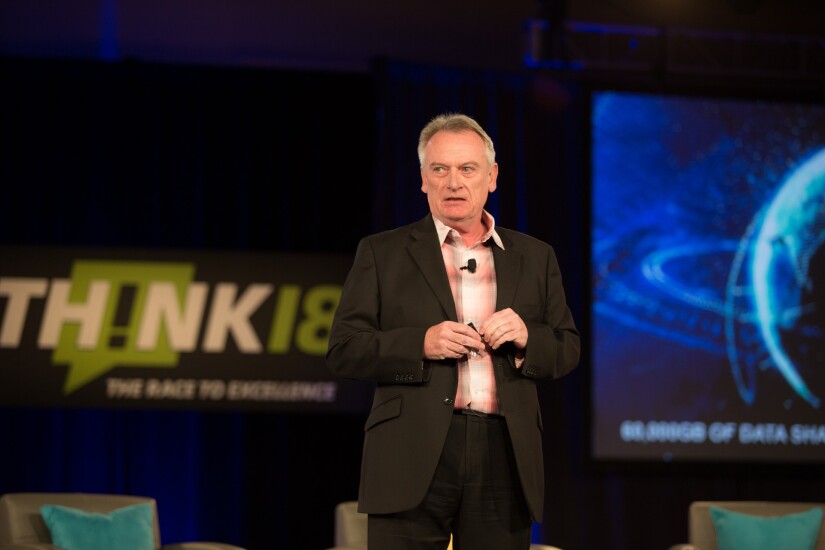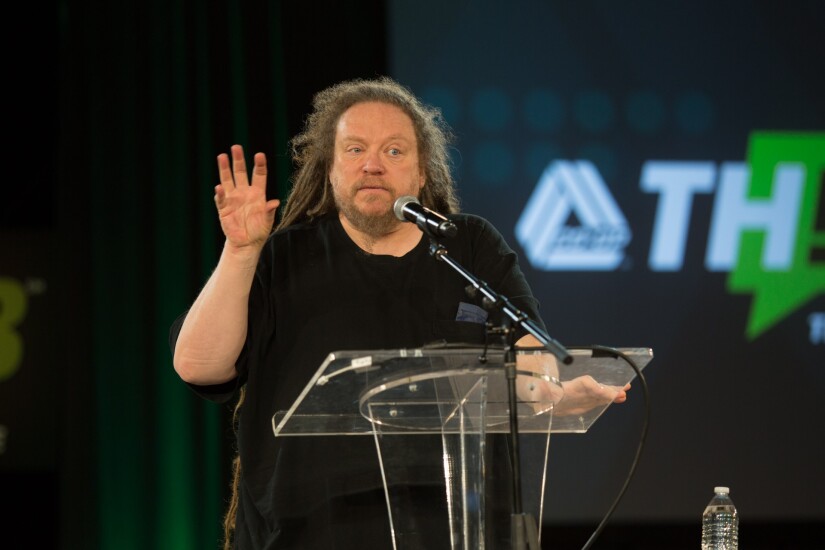
Banking that combines the best of human interaction and machine learning
More of Credit Union Journal's 2018 THINK Conference coverage is available

Former GE exec outlines the 'imagination gap'
That was the message from Beth Comstock, former vice chair at GE, who spoke Wednesday during the second day of the 2018 CO-OP THINK Conference here. Any business that gets too comfortable, she said, puts itself at risk.
“The more customers you have, the more accustomed you are and the more vulnerable you are,” she warned. “One of the defining characteristics for all of us in business is to continue to go forward without having the answers. We cannot keep doing things the same way.”
According to Comstock, there is an “imagination gap” in business – and it is a place where “possibility goes to die.” Unfortunately for creativity, she said, business people want guarantees.
“I think the imagination gap is getting bigger and bigger,” she declared.
Change seems impossible until it happens, and then it seems inevitable, Comstock continued, noting even after a major disruption, people say, “It was always going to happen like that.”
“It is time to fight for people who have courage,” she said. “Long before the Internet, artificial intelligence and computer algorithms, we demanded organizations and the people in organizations operate like machines – squeezing out imagination. We worried about failure. Studies have found 75 percent of us say we do not feel creatively challenged at work. The imagination gap is crowding out our very humanness.”
The reality is, Comstock insisted, to be successful in today’s business climate companies no longer can fail to imagine, they can no longer fail to fail. She said uncertainty cannot be banished completely, but we can change how we react to it.
For more from Comstock’s remarks,

The 'Industrial Age' model of banking no longer works
That was the message from Chris Skinner, CEO of Balatro and an author, fintech advisor and strategist.
“I describe myself as a troublemaker, and I have been a troublemaker for a long time,” he began. “There is a reason why the most valuable companies in the world today are digital content companies. Information about money has become more important than money itself.”
The business model of the typical financial institution does not fit well with the digital age, Skinner explained, because traditional banks push products through channels in order to get more customers. In the digital age, he said, the most important part is the humanity of the people, not the products or the process.
“Uber and Airbnb are platforms that connect people with each other. I call it the apps, API, analytics revolution,” he said. “We have smart things that are connected to each other. Everything is smart – smart phones, smart refrigerators. Venmo was developed because one weekend a fellow forgot his wallet and owed his friend money. Teenagers are reinventing financial services. Coding is now as important in England as being able to speak English.”
Businessware is where the next battleground will be, Skinner continued, noting it is expected one in three bank jobs will be automated by 2025. “Software is the new world. Trading will be reinvented by shared databases that are managed by technology. Clearing and settlement will save the financial industry $20 billion per year by not using paper.”
In the last five years there have been hundreds of billions of dollars invested in fintech companies, many of which are led by teenagers. As a result, Skinner said, every single process of financial services is being attacked by technology.
“Some banks are adapting well, such as BBVA in Europe and DBS in Singapore. In the U.S., JP Morgan Chase is investing heavily in digital,” he reported. “Many bankers believe their business model will not change because of digital – that it will just be banking as usual but a little bit faster. I think that is the road to ruin.”

CO-OP shifts gears
“We are building and implementing a new model today. We are a software and technology company,” Clark said, while revealing he has lived the life of writing code into the wee hours for a startup. “Making change at this company is different from running a startup because you can’t do change by yourself. Digital is raising consumer expectations. One study found by 2020, customer experience will overtake price and product as a key brand differentiator.”
The banks are “doubling down” on digital, and so has CO-OP, Clark said, declaring, “I’m not talking about omnichannel. Omnichannel – meaning making all your channels look the same – is so 10 years ago.”
Today, CO-OP is building an ecosystem, which Clark defined as an interconnected set of services, through which users can fulfill a variety of needs in one integrated experience.
“We expect fintechs will partner with legacy financial services organizations to strengthen ecosystems,” he predicted. “New ecosystems are likely to emerge in place of many traditional industries as early as 2025. Payments will be involved in all of those, and we want to make sure credit union cards will be out front.”
By 2030, CUs will have to be advice providers, access facilitators and value aggregators, Clark continued. In this brave new financial services world, credit unions will connect their members to healthcare providers, travel and leisure experiences, communications devices, and transportation resources.
“Everything we are doing at CO-OP, we are trying to humanize the experience,” he said. “We want to be data-informed, not data-driven. We don’t want the data to make the decisions.”
The path to digitization is “integrate to innovate,” Clark said, adding CO-OP is looking to create a single, integrated experience so it can put its client credit unions everywhere their members want to be.
Enterprise availability will be made through an initiative known as MyCO-OP. Clark noted some credit unions already have access to MyCO-OP, which the company is rolling out in stages.
Security is a huge concern, so CO-OP is “constantly” working on fraud monitoring and prevention, said Clark, with artificial intelligence and machine learning playing a “big part” of that effort. He noted analysts project financial services will see the greatest increase in profit margin of any industry thanks to AI – 15 percent.
Many consumers still believe their digital payments are not secure – which Clark said is a “problem” for CO-OP and its CUs. He said financial institutions have to be the trusted partner because they are 100 percent responsible for cybersecurity.
“Security is a business line,” he said.
Through machine learning, CO-OP can gather enough information to make fraud detection faster and smarter, Clark shared. He gave the example of a member who buys airline tickets to Paris, and proceeds to take an Uber to the airport, and then uses a credit card to check in to a hotel in Paris and buy a meal in Paris – and at the same time the card is used in Los Angeles. AI will know the latter transaction is fraud.
“Machine learning detects unusual usage patterns, and it learns continuously,” he said, while introducing attendees to
“We are excited to roll this out,” Clark said Wednesday. “COOPER will help us shore up our ability to do fraud detection on shared branching. COOPER is the beginning of the AI era at CO-OP. Machine learning and automation will take over a lot of what we are doing today. We cannot manually track millions of transactions. It is my view that many credit unions are way too conservative, so we want to give them the tools to open up.”

CUs' 'extraordinary opportunity' to change the system
Lanier, who is employed by Microsoft, has written several books, including “Dawn of the New Everything.” He told the THINK crowd people should use artificial intelligence as a way to enhance the human experience, as a tool to provide a clearer picture of the world.
Over the last four decades, the processing power of computing has advanced exponentially, allowing society to put computations on many parts of life, Lanier explained. He said one negative side effect is this has concentrated power and money in ways that are not sustainable.
“A few years ago there was a flash crash on Wall Street that was driven by augmented trading,” he noted. “Things have gotten out of balance. The ability of AI to think is often exaggerated. It is not a freestanding type of intelligence, it is theatrical. The principle application of AI today is to manipulate human behavior. Tech companies keep models and try to stimulate people to act.”
A thermostat constantly measures the temperature and turns on the air conditioner or the heater as needed. Lanier said one can think of a computer as a more complicated thermostat in terms of constant operation.
There is an “extraordinary opportunity” for credit unions to change the system, Lanier said, because CUs have the scale of relationships with millions of people and they have account information for those folks.
“There is nothing else like that in the United States,” he said.
Lanier suggested credit unions begin competing with Facebook and Amazon by starting a one-click account. He said this would create convenience for CU members and save them money on a variety of products.
“It would create a perception of value and power,” he said. “My understanding is a lot of your membership is employed by some organization that allows them to join a credit union, such as being a teacher or a nurse. If credit unions of the world created a network where people could buy things, it also would create a mechanism where people would get paid for their data rather than having it taken from them. We need to create a dignified future that is sustainable.”





